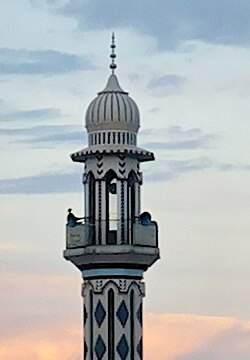Jalalpur Jattan
Jalalpur Jattan
جلالپور جٹاں | |
|---|---|
City | |
 Saqib Minar is the notable tower of the city | |
 Map of Jalalpur Jattan | |
| Coordinates: 32°38′31.0″N 74°12′11.9″E / 32.641944°N 74.203306°E | |
| Country | |
| Province | |
| District | Gujrat |
| Population | |
• Total | 146,743 |
| Time zone | UTC+5 (PST) |
| Calling code | 053 |
| Motorways | |
Jalalpur Jattan (Punjabi: جلالپور جٹاں, Urdu: جلالپور جٹاں) is a city in Gujrat District in the province of Punjab, Pakistan. It is the centre of Jalalpur Jattan Tehsil and about 50 km from Kashmir.[2]
History
[edit]When Alexander the Great defeated Porus,[3] he established two towns: one near the Jehlum River, and the other near the Chenab River. The latter, the present-day Jalalpur Jattan, was named Shaklanagar, an amalgamation of Greek and Sanskrit words meaning "the city of beauty".[4] These cities were settled by people from Alexander's multinational armies, which included a majority of Greeks. These Indo-Greek cities and their associated realms thrived long after Alexander's departure. Later, when Jalal ud din Firuz Khalji and his forces stayed here to suppress the invasion of Mongols, he renamed the city Jalalabad after himself. The name was once again changed to Jalalpur Jattan by the notable Jatts of their time, said to be Zabardast Khan and Ajmer Khan.[5][6]
During the Sikh Empire, the town gained significant importance. There is a place in Jalalpur Jattan built by Chandragupta Maurya in 300 BC.[5] Local historians believe that Chandragupta had built a fort in Salamgarh, a suburban village of Jalalpur Jattan. The original name of the village could not be ascertained but the fort became famous as Islamgarh Fort with the passage of time. The fort of Islam Garh had remained under Aurangzeb Alamgir, Ahmed Shah Abdali, and Ranjit Singh and their forces.[5] The fort had been the mint of Maharaja Ranjit Singh of Lahore in 1832. Only some deteriorated remains of the fort exist today.[7]
There is also an ancient city within the territories of the city, now a town known as Kulachor. Excavations in the area revealed that Kula Chor was the mint of the Maurya Dynasty.[8]
In 1908, Jalalpur Jattan was made a municipality or municipal committee, the fully representative body.[9][10] The city was granted tehsil status in November but it still in process due to lack of interest. 2016.[11]
Climate
[edit]


The town has moderate climate. The average temperature of the city is 23.9 °C. During the peak of summer, the daytime temperature shoots up to 45 °C, but the hot spells are relatively short due to the proximity of the Azad Kashmir mountains. During the winter, the minimum temperature may fall below 2 °C. The rainfall in the city is remarkable, with precipitation even during the parched months. The average rainfall is 802 mm.[12]
Economy
[edit]
The city is famous for its cottage industry of textile[13] and its local sweets called Khatai. Jalalpur Jattan connects Gujrat with multiple cities through the Jalalpur–Gujrat Road.
Jalalpur Jattan is head office of the Sadar Circle Gujrat.
Cantonment
[edit]Jalapur Jattan has a small cantonment area, which has its importance due to its proximity with the line of control and important strategic cities of Azad Kashmir like Chamb, Kot Jamil and important headworks of river Chenab such as Head Marala.
Notable people
[edit]- Ejaz Durrani, Actor - He was married to the famous singer, Noor Jehan.
- Rajendra Krishan, Bollywood songwriter
- Raj Babbar, Indian actor and politician
See also
[edit]References
[edit]- ^ Citypopulation.de Population of Jalalpur Jattan
- ^ Tehsils & Unions in the District of Gujrat – Government of Pakistan Archived 2009-02-14 at the Wayback Machine
- ^ "Alexander The Great | Encyclopedia.com".
- ^ "History of Jalalpur Jattan". vojpj.com.
- ^ a b c "جلالپور جٹاں کی تاریخ" [History of Jalalpur Jattan]. vojpj.com.
- ^ "HISTORY OF JALAPURJATTAN". 7 October 2020. Retrieved 23 September 2021.
- ^ Miraj, Muhammad Hassan (10 September 2012). "Seven long decades". DAWN.COM. Retrieved 23 September 2021.
Somewhere, in this area, a town, much famous has existed since what looks like eternity. It has been for so long that nobody can really tell when the mint installed by Alexander passed to the Maurya Empire and when they started casting the one-eyed image of Maharaj Ranjit Singh on coins. The "Who, What, When and Where" questions about Jalaldin, Shakla Nagar and Kalachur, remain unanswered. The ruins of Islamgarh Fort, however, can be seen.
- ^ Historical sites in Gujrat crumbling – Daily Times Pakistan
- ^ Butt, Waseem Ashraf (10 November 2013). "Gujrat reverts to municipal committee status". Dawn. Retrieved 20 October 2019.
- ^ Waseem Ashraf Butt (8 October 2013). "Gujrat may get municipal corporation status". dawn.com.
- ^ Waseem Ashraf Butt (20 November 2016). "Jalalpur Jattan notified as tehsil". dawn.com.
- ^ en.climate-data.org/location/28949/
- ^ "Gujrat Culture | Gujrat History". Archived from the original on 18 May 2015. Retrieved 25 April 2015.


